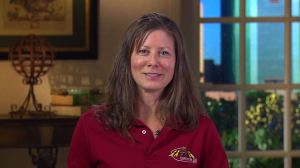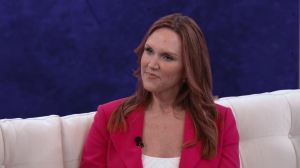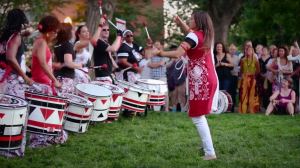STEM, or academic disciplines related to science, technology, engineering, and M=math are not only the building blocks of modern innovation, but they result in some of the highest-paid jobs in the world.
Despite the field’s significance, studies show that in the United States, less than 15 percent of all fourth to eight grade girls actually show an interest in STEM topics. Many factors influence young girls’ lack of interest, which could inhibit both their own academic pursuits, and the future of science and technological breakthroughs.
But as more and more STEM leaders are made aware of this gender disparity, innovative new products and programs are being rolled out that could transform the trends and get more girls inspired to pursue a STEM career.
This week’s Full Frame turns its lens on the current issues that are preventing girls from pursuing STEM fields and introduces viewers to influential female leaders who are using their own success in STEM fields to inspire young women with the tools and confidence that they need to succeed.
Tracy Caldwell Dyson: Even Space is Not a Limit
Tracy Caldwell Dyson knows what it really means to reach for the stars.
Although she struggled to learn math in school, the unrelenting support of her parents helped Caldwell Dyson to overcome many challenges as a student. She went on to earn a PhD in Chemistry, and in 1998, she landed a job at NASA.
Today, Caldwell Dyson is distinguished as one of the most influential women in the realm of contemporary space science, she is one of only 57 female astronauts to have traveled into outer space.
But it doesn’t stop there, Caldwell Dyson is also recognized for her impact on the deaf community. During her time in space, she made a video to teach the deaf community about life aboard the International Space Station. Her video not only enhanced other astronauts’ interest in sign language, but it also encouraged deaf students to become involved, and feel more included, in science and space endeavors.
From her own experiences studying math and science, the astronaut has come to believe that the key to engaging students in STEM learning lies in encouraging them to explore and harness their own sense of curiosity.
On this episode of Full Frame, Caldwell Dyson tells Mike Walter about some of her most memorable experiences as an astronaut, the exciting future of space travel, and the importance of inspiring young people to confidently pursue their dreams.
DIY girls and STEM engagement
While women hold nearly half of all jobs in the United States economy, they are employed in less than 25 percent of STEM-related jobs.
Luz Rivas is working to change that number.
Rivas is one of only a few Latina women to have pursued and worked in the male-dominated engineering field. After attending MIT and Harvard, Rivas was employed as a hardware engineer for Motorola. Rivas believes being introduced to computer programming in fifth grade was the experience that sparked her interest in science and technology.
She thinks the main problem for female students today is that they are not exposed to enough STEM learning experiences that could lead them to pursue science and technological careers early in their education.
Rivas is now working to become part of the solution. In 2011, she returned to Pacoima, the high-poverty California community where she grew up, to start a program called DIYgirls. The program partners with local schools to supply young girls with hands-on learning opportunities that teach them about technology and creative problem solving, and inspires them to create their own technical inventions.
Through the program, Rivas hopes to prepare female students to pursue, and excel, in STEM careers.
Rivas joins Mike Walter to reflect on her own experiences as a Latina woman in a male-dominated field and, along with her DIY GIRLS member Sophia Caloca, she discusses the vital impact and community-driven influence of her innovative learning program.
Follow Luz Rivas on Twitter: @LuzRivas and learn more about DIYgirls at diygirls.org
After the show, we asked Luz Rivas one more question on how STEM can really benefits women.

Luz Rivas shares how STEM can benefit women
While women hold nearly half of all jobs in the United States economy, they are employed in less than 25 percent of STEM-related jobs.
We asked DIY GIRLS member Sophia Caloca one more question: What’s the most fun thing about being a DIY girl?

Sophia Caloca explains why she loves being a 'DIY girl'
Rivas joins Mike Walter to reflect on her own experiences as a Latina woman in a male-dominated field and, along with her DIY GIRLS member Sophia Caloca, she discusses the vital impact and community-driven influence of her innovative learning program.STEM toys: Building the right foundation
What if the solution to the gender gap among STEM jobs comes from changing the way young girls play? Full Frame sat down with two women empowerment advocates who believe toys could transform the landscape of STEM for the next generation.
When Alice Brooks was eight years old, she asked Santa Claus for a Barbie. Instead, she received a saw. With it, she built her own dolls and toys and the experience directed her towards a very bright future. Brooks went on to study mechanical engineering at MIT and she obtained a master’s in mechanical engineering design from Stanford University. Brooks believes her love of engineering is a result of her parents’ pushing her to build things early in her life.
Today, she designs toys to engage girls in STEM learning. Brooks’ celebrated creation, Roominate, is a kit of building pieces and circuit components, which inspires children to use their own creativity to design, build, wire, and decorate a unique interactive room.
Anea Bogue has nearly 20 years of experience as an educator, certified life coach, consultant, writer and highly sought-after speaker. She has dedicated half of her life to a cause that she is extremely passionate about – empowering women and girls.
Bogue founded the organization REALgirl, which is dedicated to inspiring and guiding 9 to 16 year old girls to discover their ‘REAL’ (authentic) selves and develop the skills, knowledge, confidence and courage they need to consistently make informed life-choices based on self-knowledge, self-respect and strength.
Together with Mike Walter, Bogue and Brooks discuss how a girl’s future is formed by her childhood environment. They also share a few fun innovations that can help to boost a young girl’s potential from an early age.
Learn more about Alice and Anea’s work on Twitter: @AneaBogue and @Roominate
Anea Bogue answers our one more question on how she feels about fashion.

Anea Bogue describes her fashion sense
Anea Bogue has nearly 20 years of experience as an educator, certified life coach, consultant, writer and highly sought-after speaker. She has dedicated half of her life to a cause that she is extremely passionate about – empowering women and girls.We asked one more question on how Alice Brooks imagines her career other than an engineer.

Alice Brooks imagines what she'd do if she wasn't an engineer
When Alice Brooks was eight years old, she asked Santa Claus for a Barbie. Instead, she received a saw. With it, she built her own dolls and toys and the experience directed her towards a very bright future. Brooks went on to study mechanical engineering at MIT and she obtained a master's in mechanical engineering design from Stanford University. Brooks believes her love of engineering is a result of her parents’ pushing her to build things early in her life.Batala drummers: Living to their own beat
Lastly, Full Frame heads to Washington D.C. to meet an unconventional all-female music ensemble empowered by a captivating music style that emerged during the 1970’s Brazilian civil rights movement.
Batala is an international music group distinguished by its uniquely intensified style of drumming. The musical style draws its roots from Afro-Brazilian samba-reggae that inspired Brazil’s communities to connect to their own African roots in the midst of civil discrimination in the 1970’s.
Since then, the movement has endured as an enchanting symbol of empowerment.
Although there are currently more than 25 Batala bands around the world, the Batala band in D.C. is different. It is one of the first Batala bands made up of all female performers. The group continues to spread Batala’s empowering roots as a symbol of female emancipation.
Full Frame meets Batala D.C.’s 85-member ensemble to learn how the drummers are energized and empowered by playing an instrument that is sometimes deemed too heavy and daunting for women.
Follow Batala DC on Twitter: @BatalaDC
 CGTN America
CGTN America





